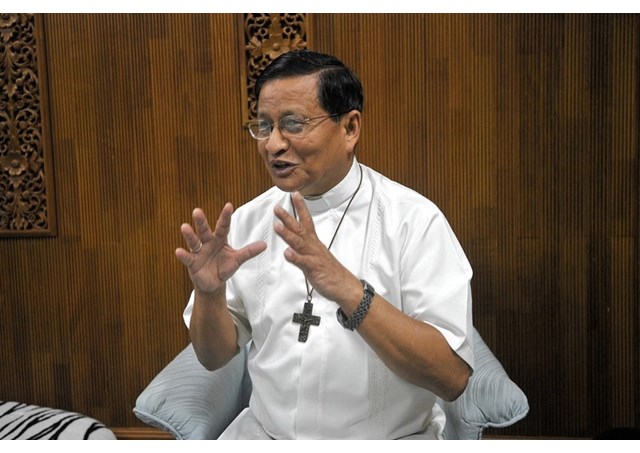
Myanmar Religious leaders: "Peace is the common good"

Peace is the supreme good for all citizens and all communities in Myanmar: says a heartfelt appeal to political and military leaders launched by a group of Burmese religious leaders, including Cardinal Charles Maung Bo, Archbishop of Yangon. In the document, sent to Fides by the Cardinal himself, says: "We, representatives of all religions living in Myanmar appeal to political leaders, military leaders and armed groups, so that they seek the path of reconciliation and peace as a common good of all people".
Religious leaders are concerned about the new clashes in the civil conflict among the armed groups of ethnic minorities and the Burmese army in the states of Kachin and Karen, as well as for new religious violence against the Muslim minority Rohingya in Arakan state, which broke out right after the national conference on ethnic minorities organized in September by the Burmese government.
The recent clashes between Myanmar’s armed forces (Tatmadaw) and what the military call a "a militant group of Rohingya Muslims" have increased. In the latest incident, at least 30 Muslim fighters are said to have died. This has led Card. Charles Maung Bo, to issue an appeal over the renewed fighting between government forces and rebel groups in Rakhine State (western Myanmar). Rohingya are a Muslim minority (just over a million people) originally from Bangladesh, who have been denied Myanmar citizenship and whose members live in refugee camps in several parts of the country.
Current military operations are concentrated in Maungdaw, on the border with Bangladesh. Security forces have cordoned off the area, preventing the entry of humanitarian aid and independent observers. Since early October, 60 Rohingyas and 17 government soldiers have died in clashes. Government soldiers continue to go from village to village to clear them of rebel elements. Residents and human rights activists have slammed the military for carrying out summary executions, rapes and arson. According to Human Rights Watch, at least 430 homes of Rohingya refugees were set on fire for no reason.
In a country of about 135 ethnic groups, peaceful coexistence has always been a struggle, especially with the central government, which is dominated by ethnic Burmese.
After the military and several rebel groups signed an armistice in October 2015, peace talks resumed in late August at the Panglong Conference (promoted by Aung San Suu Kyi), but so far they have not yielded any of the desired results.
For Card Bo, “Our wars are not winnable. Sixty years have proved that. They have inflicted chronic suffering on thousands. They have deterred human development and provoked greater animosity.”
The text sent to Fides emphasizes the elements of hope: "Democracy is in its early days. We had a new Panglong conference with the participation of all minority groups. Our country is courted by the world. Millions of tourists arrive to visit this country every year. We have had peaceful elections, we have a legitimate parliament. President Daw Su leads the nation with confidence and wisdom. Our dreams are slowly becoming reality. We deeply appreciate all those who worked for it".
But there are downsides: "The nightmare of war continues. There are more than 200,000 internally displaced people. New conflicts are added to old ones. The presence of refugees proliferates the human trafficking, the phenomenon of drugs and violence threatens to explode in communities. Internal conflicts have caused chronic suffering to thousands of people, discouraging human development and have caused much animosity".
Religious leaders recall that in 1947, General Aung San, Prime Minister of the first government of the nation, "had the foresight to involve everyone in the dialogue, exploring the agreement factors first and leaving the contentious issues later. Aung San favored a federal solution".
The text continues: "We appeal to all of you, political leaders of the National League for Democracy, the military chiefs, leaders of armed groups, ethnic political parties and civil society groups, to explore a common policy for conflict resolution. We call on all the religious leaders so that they are an instrument of peace. Myanmar needs one religion today: that is peace, it is our common religion". "We are brothers and sisters. It is urgent to stop wars and build peace and justice for all", he concludes.
(Source: Agenzia Fides; AsiaNews)
| All the contents on this site are copyrighted ©. |


